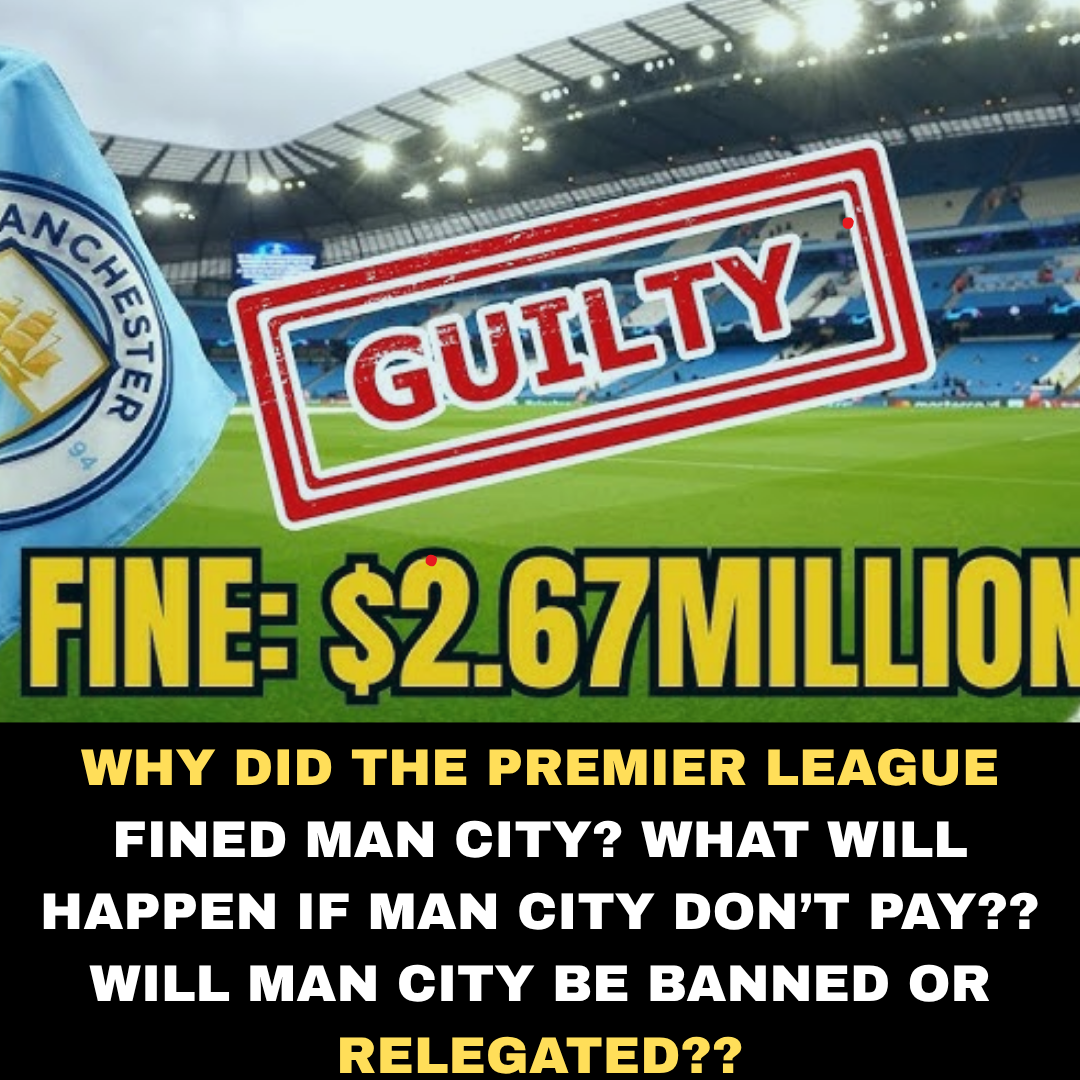Why the Premier League has fined Man City £1m

The Premier League’s decision to impose a substantial £1 million fine on Manchester City for repeated breaches of kick-off and restart timing regulations has sent shockwaves through English football. This penalty, announced on June 19, 2025, represents not merely a financial sanction but a statement about the league’s commitment to maintaining professional standards and protecting the integrity of the game. The fine stems from nine separate incidents of delayed kick-offs and restarts during the 2024-25 season, marking the second consecutive year that City has faced significant punishment for similar infractions.
This latest development comes at a particularly sensitive time for Manchester City, as the club continues to await the verdict on 115 separate charges related to alleged Financial Fair Play (FFP) violations. While these charges are unrelated to the time-wasting penalties, they contribute to a broader narrative of scrutiny surrounding one of English football’s most successful clubs of the past decade.
The Nature of the Violations
The Premier League’s investigation revealed that Manchester City committed nine distinct breaches of timing regulations across various matches during the 2024-25 season. These violations occurred during both home and away fixtures, suggesting a pattern of behavior rather than isolated incidents. The affected matches included high-profile encounters against some of the Premier League’s most established clubs, as well as fixtures against newly promoted sides.
At home, City’s Etihad Stadium witnessed delays during matches against Southampton, Tottenham Hotspur, Nottingham Forest, Manchester United, West Ham United, and Newcastle United. The variety of opponents suggests that the delays were not tactical responses to specific teams but rather indicative of systematic issues with the club’s approach to game management and timing protocols.
Away from home, City faced similar timing issues during visits to Crystal Palace, Aston Villa, and Ipswich Town. The inclusion of these away fixtures in the sanctions demonstrates that the problems extended beyond the club’s home environment and reflected broader organizational challenges in adhering to Premier League timing standards.
The most egregious violations involved restart delays of two minutes and 22 seconds each during matches against West Ham United and Ipswich Town. In professional football, where every second can be crucial to the flow and outcome of a match, such significant delays represent serious breaches of sporting protocol. These extended delays not only disrupt the rhythm of the game but also impact broadcasting schedules, fan experience, and the overall professional presentation of the Premier League as a global product.
Historical Context and Repeat Offenses
This £1 million fine represents the second consecutive year that Manchester City has faced substantial financial penalties for time-wasting violations. In 2024, the club paid £2 million to the Premier League for similar breaches of game-delay rules, making the total financial impact of these violations £3 million over two seasons. This pattern of repeat offenses suggests that the previous penalty failed to serve as an adequate deterrent or that the club struggled to implement effective corrective measures.
The escalation in financial penalties reflects the Premier League’s increasingly strict approach to timing violations. While the 2025 fine of £1 million is smaller than the previous year’s £2 million penalty, it still represents a significant financial sanction and demonstrates the league’s unwillingness to tolerate repeated infractions. The reduction in the fine amount may reflect either fewer violations or less severe delays compared to the previous season, though specific comparative data has not been made publicly available.
The fact that City has now faced two consecutive years of penalties for similar violations raises questions about the club’s internal processes and commitment to compliance with Premier League regulations. Professional football clubs at City’s level typically have extensive administrative and operational support systems designed to ensure adherence to league rules and regulations. The repeated nature of these violations suggests either systemic failures in these support systems or a lack of prioritization of timing compliance within the organization.
The Premier League’s Enforcement Philosophy
The Premier League’s statement accompanying the fine announcement provides insight into the organization’s enforcement philosophy and priorities. The league emphasized that “rules relating to kick-offs and re-starts help ensure the organisation of the competition is set at the highest possible professional standard and provides certainty to fans and participating clubs.” This language underscores the Premier League’s view that timing regulations are not merely administrative requirements but fundamental components of professional sports presentation.
The league’s additional comment that these rules ensure “the broadcast of every Premier League match is kept to schedule” highlights the commercial realities underlying timing enforcement. The Premier League is a global broadcasting product worth billions of pounds annually, with television schedules carefully coordinated across multiple time zones and markets. Delays in kick-offs and restarts can have cascading effects on broadcasting networks, potentially impacting advertising commitments, viewer experience, and the league’s relationships with media partners worldwide.
This commercial dimension of timing enforcement reflects the modern reality of professional football, where sporting considerations must be balanced with broadcast requirements and global audience expectations. The Premier League’s willingness to impose substantial financial penalties for timing violations demonstrates its commitment to protecting these commercial interests while maintaining the sporting integrity of the competition.
Manchester City’s Response and Compliance Efforts
Following the announcement of the fine, Manchester City accepted responsibility for the violations and issued a public apology. The club’s statement confirmed that they have “reminded their players and staff of their responsibilities in complying with the rules,” suggesting recognition of the need for improved internal processes and communication.
This response represents a pragmatic approach by City’s management, avoiding potential escalation through appeals or disputes while demonstrating cooperation with Premier League enforcement efforts. The club’s acceptance of responsibility and commitment to improved compliance may help mitigate potential future penalties and demonstrate good faith efforts to address the underlying issues.
The club’s confirmation that they have reminded players and staff of their responsibilities suggests that the violations may have resulted from inadequate awareness or communication of timing requirements rather than deliberate disregard for league rules. This interpretation would be consistent with operational failures rather than intentional misconduct, though the repeated nature of the violations across multiple matches and seasons complicates this narrative.
City’s response also indicates recognition that timing compliance requires active management and cannot be left to chance or individual discretion. Professional football clubs must treat timing regulations as seriously as other competitive and administrative requirements, with clear protocols, assigned responsibilities, and regular monitoring to ensure compliance.
Impact on Club Operations and Culture
The £1 million fine represents more than just a financial penalty; it serves as a significant reputational challenge for Manchester City and may impact the club’s operational culture and procedures. For a club of City’s stature and resources, repeated violations of basic timing regulations raise questions about organizational effectiveness and attention to detail.
The financial impact, while substantial, is unlikely to significantly affect City’s operations given the club’s considerable resources and revenue streams. However, the reputational impact may be more significant, particularly given the ongoing scrutiny surrounding the club’s Financial Fair Play charges. The timing violations, while unrelated to FFP concerns, contribute to a broader narrative of regulatory challenges that may affect the club’s standing within English football.
The repeated nature of the violations may also prompt changes in City’s operational procedures and staff responsibilities. The club will likely need to implement more robust systems for monitoring and ensuring timing compliance, potentially including dedicated staff assignments, enhanced communication protocols, and regular training for players and coaching staff.
These operational changes represent an additional cost beyond the direct financial penalty, as the club must invest time and resources in developing and maintaining compliance systems. However, such investments are essential for preventing future violations and protecting the club’s reputation and relationships with league authorities.
Broader Implications for Premier League Governance
Manchester City’s repeated timing violations and the league’s response reflect broader themes in Premier League governance and enforcement. The willingness to impose substantial financial penalties on one of the league’s most successful and high-profile clubs demonstrates the Premier League’s commitment to uniform rule enforcement regardless of club status or achievements.
This approach to governance helps maintain the league’s credibility and integrity by showing that no club is above the rules, regardless of their sporting success or commercial importance. The Premier League’s global reputation depends partly on perceptions of fair and consistent governance, making uniform enforcement essential for long-term success.
The timing violation penalties also illustrate the Premier League’s broader evolution toward more sophisticated and comprehensive regulation of club behavior. Modern football governance extends far beyond traditional sporting concerns to encompass commercial, operational, and administrative requirements that reflect the sport’s transformation into a global entertainment industry.
The league’s detailed monitoring and enforcement of timing regulations demonstrates the infrastructure and commitment required for effective sports governance in the modern era. This level of oversight requires significant resources and expertise but is essential for maintaining professional standards and protecting the league’s commercial and sporting interests.
Financial Fair Play Context and Regulatory Scrutiny
While the timing violations are officially unrelated to Manchester City’s ongoing Financial Fair Play charges, they occur within a broader context of regulatory scrutiny that may influence public and industry perceptions of the club. City currently faces 115 charges related to alleged FFP violations covering a period from 2009 through the 2022-23 season, representing one of the most significant regulatory challenges in modern English football.
The club has consistently denied any wrongdoing regarding the FFP charges and maintains its innocence while awaiting the verdict of the independent commission reviewing the case. However, the timing of the repeated violations penalties may complicate the club’s efforts to present itself as a fully compliant and cooperative member of the Premier League community.
The convergence of timing violations and FFP charges, while legally unrelated, creates a narrative of regulatory challenges that may affect stakeholder perceptions and relationships. Sponsors, partners, fans, and other stakeholders may view the cumulative impact of these regulatory issues as indicative of broader governance challenges within the organization.
The resolution of the FFP charges will likely have far more significant implications for Manchester City than the timing violations, potentially including points deductions, transfer restrictions, or other sporting penalties. However, the timing violations serve as a reminder of the comprehensive regulatory environment in which modern football clubs operate and the importance of compliance across all areas of operation.
Commercial and Broadcasting Considerations
The Premier League’s emphasis on maintaining broadcast schedules in its enforcement of timing regulations reflects the central role of television and media rights in modern football economics. The league’s domestic and international broadcasting agreements are worth billions of pounds annually and require precise scheduling coordination to maximize audience reach and advertising value.
Delays in kick-offs and restarts can have significant downstream effects on broadcasting operations, potentially affecting program schedules, advertising commitments, and viewer experience across multiple markets and time zones. For a global product like the Premier League, maintaining schedule reliability is essential for preserving relationships with broadcast partners and maximizing commercial value.
The financial penalties for timing violations can be understood as protecting these broader commercial interests by incentivizing clubs to prioritize schedule compliance. The substantial fines serve as a deterrent while compensating for potential commercial disruption caused by delays and reinforcing the importance of timing discipline within the league’s operational culture.
This commercial dimension of timing enforcement illustrates the complex balancing act required in modern football governance, where sporting considerations must be integrated with broadcast requirements, fan expectations, and commercial obligations. The Premier League’s success in managing these multiple priorities has contributed to its position as the world’s most commercially successful football league.
Fan Experience and Sporting Integrity
Beyond commercial considerations, timing violations also impact fan experience and sporting integrity. Supporters who attend matches, whether in person or through broadcasts, have reasonable expectations regarding schedule reliability and game flow. Repeated delays can frustrate fans and detract from the overall entertainment value of the Premier League product.
For attending fans, delays can create practical challenges including travel arrangements, childcare considerations, and other scheduling commitments. The Premier League’s global fanbase includes supporters who arrange their schedules around match times, making reliability an important component of fan satisfaction and engagement.
From a sporting perspective, timing violations can affect game flow and competitive balance. While two-minute delays may seem minor in the context of 90-minute matches, they can disrupt player preparation, tactical discussions, and the psychological momentum that influences match outcomes. Consistent timing enforcement helps ensure that all clubs compete under similar conditions and that external factors do not unduly influence sporting results.
The Premier League’s commitment to timing enforcement thus serves multiple constituencies including fans, broadcast partners, and clubs themselves by maintaining the professional standards that support the league’s global appeal and commercial success.
Looking Forward: Prevention and Compliance
Manchester City’s response to the fine, including their commitment to remind players and staff of timing responsibilities, suggests recognition of the need for improved compliance systems. Effective prevention of future violations will likely require comprehensive changes to the club’s operational procedures and culture.
Successful compliance programs typically include clear policy communication, regular training, assigned responsibilities, monitoring systems, and consequences for non-compliance. City will need to develop and implement such systems while ensuring they do not unduly interfere with sporting preparation and performance.
The club’s experience with repeated violations provides valuable lessons for other Premier League clubs regarding the importance of timing compliance and the potential consequences of inadequate attention to regulatory requirements. Other clubs may review their own procedures in light of City’s experience to ensure they avoid similar penalties.
The Premier League’s enforcement approach, including substantial financial penalties and public disclosure, serves as a deterrent while demonstrating the organization’s commitment to maintaining professional standards across all aspects of league operations.
Conclusion
Manchester City’s £1 million fine for timing violations represents more than a simple administrative penalty; it reflects the complex regulatory environment of modern professional football and the Premier League’s commitment to maintaining the highest professional standards. The repeated nature of the violations, following similar penalties in the previous season, suggests systematic challenges within the club’s operational procedures that require comprehensive attention and remediation.
The fine occurs within a broader context of regulatory scrutiny surrounding Manchester City, though the timing violations remain officially separate from the ongoing Financial Fair Play charges. Nevertheless, the cumulative impact of these regulatory challenges may influence stakeholder perceptions and underscore the importance of comprehensive compliance across all areas of club operations.
The Premier League’s enforcement approach demonstrates the organization’s evolution toward sophisticated governance that balances sporting integrity, commercial requirements, and fan expectations. The willingness to impose substantial penalties on high-profile clubs reinforces the principle that no organization is above the rules and helps maintain the credibility essential for the league’s continued global success.
For Manchester City, the challenge now lies in implementing effective systems to prevent future violations while managing the broader regulatory environment surrounding the club. The financial impact of the timing violations, while significant, pales in comparison to the potential consequences of the FFP charges, making comprehensive compliance and reputation management essential priorities for the organization.
The broader football community will watch closely to see whether City can successfully address these compliance challenges and whether the Premier League’s enforcement approach proves effective in maintaining the professional standards that underpin the league’s global success. The outcome of these efforts will have implications not only for Manchester City but for the future of football governance and the balance between sporting competition and commercial requirements in the modern game.















